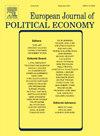Social welfare and the group size paradox
IF 2.4
3区 经济学
Q2 ECONOMICS
引用次数: 0
Abstract
Tullock (1967) argues that the welfare costs of tariffs and monopoly extend beyond traditional deadweight loss measures to include both resources devoted to obtaining the transfer and resources spent resisting the transfer. This includes resources spent lobbying the government for the implementation of a favorable policy. Olson (1965) argues that lobbying activity frequently provides a nonexcludable good to an interest group and therefore may be subject to a free-rider problem. I use a Tullock (1980) style contest to analyze how the free-rider problem, the extent of the deadweight loss and bias in the policy process interact in determining the social loss resulting from lobbying activity. For plausible parameter values, an increase in the ability of the group potentially subject to the transfer to overcome the free-rider problem worsens social welfare by increasing expenditure in the transfer-seeking game even as it makes the distortion inducing transfer less likely. There are also plausible parameter values under which an increase in the bias of the policy process towards the group seeking the transfer raises social welfare by reducing expenditures in the transfer seeking game even as it makes the distortion inducing transfer more likely.
社会福利和群体规模悖论
Tullock (1967)认为,关税和垄断的福利成本超出了传统的死重损失衡量标准,既包括用于获得转让的资源,也包括用于抵制转让的资源。这包括为实施有利政策而游说政府所花费的资源。Olson(1965)认为,游说活动经常为利益集团提供非排他性商品,因此可能会出现搭便车问题。我采用 Tullock(1980 年)式的竞赛来分析搭便车问题、死重损失程度和政策过程中的偏差如何相互作用,以决定游说活动造成的社会损失。在参数值合理的情况下,如果可能接受转移支付的群体克服搭便车问题的能力增强,则会增加寻求转移支付博弈中的支出,从而使社会福利恶化,即使它使诱发扭曲的转移支付的可能性降低。还有一些可信的参数值,在这些参数值下,政策过程对寻求转移的群体的偏向性增加,会减少寻求转移博弈中的支出,从而提高社会福利,即使它使诱发扭曲的转移更有可能发生。
本文章由计算机程序翻译,如有差异,请以英文原文为准。
求助全文
约1分钟内获得全文
求助全文
来源期刊

European Journal of Political Economy
Multiple-
CiteScore
3.40
自引率
10.00%
发文量
106
期刊介绍:
The aim of the European Journal of Political Economy is to disseminate original theoretical and empirical research on economic phenomena within a scope that encompasses collective decision making, political behavior, and the role of institutions. Contributions are invited from the international community of researchers. Manuscripts must be published in English. Starting 2008, the European Journal of Political Economy is indexed in the Social Sciences Citation Index published by Thomson Scientific (formerly ISI).
 求助内容:
求助内容: 应助结果提醒方式:
应助结果提醒方式:


